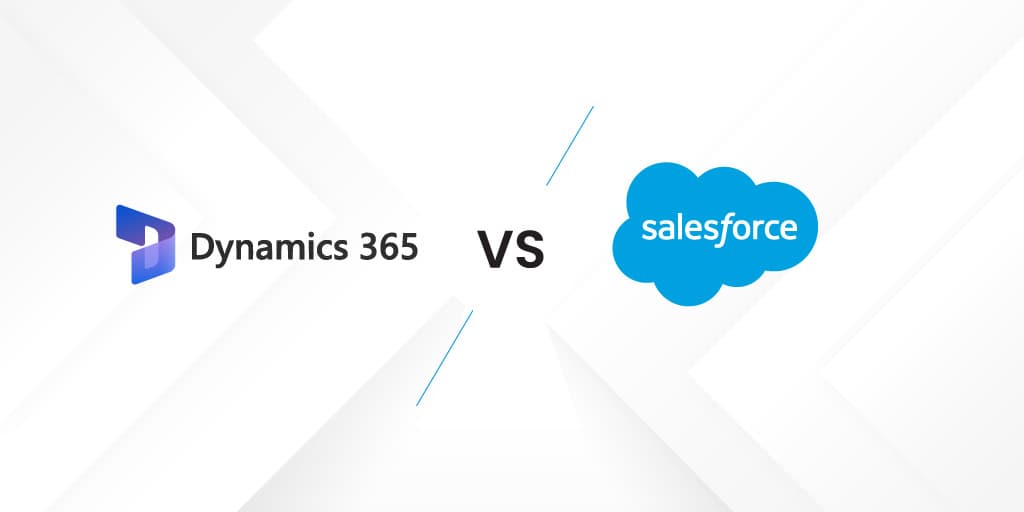Dynamics 365 vs. Salesforce; which CRM will help your business prosper?
CRM software has helped companies expand their reach with enhanced customer interactions and tracking with advanced data storage features. As a result, the demand for top-grade CRM software has risen dramatically in the business world. Two giant providers have taken the top spots: Microsoft Dynamics 365 and Salesforce.
But with both of them being industry giants vying for your attention, choosing one can feel taxing. Did you know that 65% of businesses face challenges when choosing a CRM solution?
The Dynamics 365 and Salesforce CRMs have features—developed over the years—that have successfully empowered companies and their business. It appears, though, that Dynamics 365 has a slight edge over Salesforce. This blog explores the differences commonly acknowledged factors such as price ranges, accessibility, and software deployment?
The significance of Dynamics 365 CRM
Dynamics 365 CRM is often favored by mid-sized to large enterprises, particularly those already invested in the Microsoft ecosystem. Its integration with Microsoft products like Office 365 can be a significant advantage.
Dynamics 365 CRM empowers companies to analyze and adjust their operation in close consideration of market intelligence, allowing them to maintain good social relationships with their customers. In short, this CRM improves business interactions within an organization by applying appropriate technology.
This CRM is available as a cloud offering and on-premises installation; both with a diverse set of features.
Dynamics 365 is famous for the following features:
- Improved customer relationship
- Access to social data and relationship management for better sales
- Accelerates an agile marketing plan
- World-class customer service
- Live social engagement insights
Salesforce CRM
Renowned for its scalability and extensive customization options, Salesforce caters to a wider range of businesses, from startups to large enterprises. Its robust app marketplace offers a vast array of industry-specific solutions across all departments, such as marketing, sales, commerce, service, and IT. This CRM gives a 360-degree view of prospects that helps businesses in the following manner:
- Keeps data in one place
- Proactive
- Automation improves business processes
- User-friendly
Salesforce CRM has an excellent standing in the market, but not without shortcomings:
- Cost: Compared to Dynamics 365, Salesforce can be more expensive, especially with the addition of required add-on features. Factor in potential hidden costs like ongoing maintenance and per-user fees.
- Implementation Complexity: Setting up and configuring Salesforce can be time-consuming, requiring significant technical expertise. The learning curve for users can also be steep, potentially hindering adoption and impacting initial productivity.
- Support: Some users report limitations with Salesforce’s customer support, particularly regarding specific inquiries about dashboards and reports.
Salesforce vs Microsoft dynamics 365 comparison
| Aspect |
Dynamics 365 CRM |
Salesforce CRM |
| Deployment |
Cloud-based (SaaS), on-premises, hybrid |
Primarily designed for the cloud model |
| Integration |
More native integrations, seamless with Microsoft products |
Extensive third-party ecosystem, 3,000+ apps on AppExchange |
| Subscription and Pricing |
Starting at $50/user/month (Sales) |
Starting at $25/user/month |
| Implementation Time |
Varies from a few months to several months |
From a few weeks to a few months(scalable with growth) |
| Features |
Integration with Microsoft products.
Feature-rich modules for Sales, Marketing, and Customer Service Management.
Community building features.
Online and offline access.
Quick user adoption. |
Contact management.
Opportunity management.
Quote management.
Quote to cash process.
Einstein Analytics (AI-powered insights).
Email integration. |
| AI Capability |
Leverages Azure AI services (insights, automation, chatbots, virtual agents, sentiment analysis, predictive analytics) |
Salesforce Einstein (some features as paid add-ons) |
Dynamics 365 CRM vs. Salesforce—the similarities
Microsoft Dynamics 365 and Salesforce are different in many ways. However, there cover common ground in the following ways:
| Reporting |
Reporting with built-in capabilities makes it easier to use for non-technical users. |
| Customization |
Easy customization with pre-built tools |
| Business size |
Serves businesses of any size. (However, Salesforce may be overkill for small-sized companies.) |
LevelShift—Microsoft services on demand
When you choose Microsoft Dynamics 365, partnering with a Microsoft Certified Partner can mitigate the risks associated with the process. With deep knowledge of Dynamics 365, they can customize and integrate it smoothly with your existing workflows. Experts at LevelShift finetune the entire implementation process, minimizing disruption and reducing costs. We don’t just set it up, we also provide ongoing support and training, equipping your team to make the most of Dynamics 365. Talk to us to Find out which CRM is best for you.
LevelShift is a Microsoft Solutions partner with many successful collaborations and a team of data experts in the ERP and CRM arena. What clients love the most about the experience—in addition to sticking to the timeline—is the pay-as-you-use model that requires you to pay only for the number of hours used.
LevelShift’ experts can help you understand both Dynamics 365 and Salesforce CRMs with a quick call. Find out which one is best for you.
Tags
#Microsoft Dynamics 365 vs. Salesforce#Salesforce vs Microsoft dynamics







